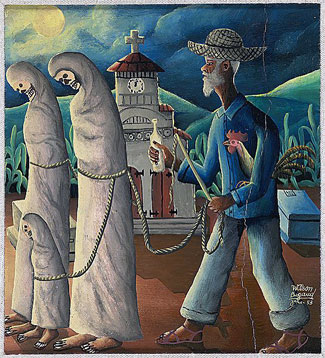No. No. No.
No.
No.
Okay, so I’m about half of the way through Doc of the Dead on Netflix (it’s a
little too goofy for its own good, but it has some stunning visuals in its
interlude pieces and it includes fascinating interviews from some very heavy
hitters in the zombie community) and I’m getting really frustrated, so I’m
going to take a few minutes to just vent here.
Cool? Good.
Here’s my problem: Haitian zombies aren't zombies.
There, I said it. They just aren't.
Although
they share a name with the creature introduced and popularized by the works of
Romero (a slow moving, mindless, reanimated corpse that craves human flesh, that multiplies
by killing victims who then become zombies, and that can only be (re)killed by
a direct attack on its brain), the Haitian Vodou zombie should not be confused with zombies as we now
think of them (i.e. the zombies this blog is dedicated to). Despite a few obvious similarities, in most observable ways the
Haitian zombie and the Romero zombie are two separate constructs and, though
linked thematically, should be considered as distinct from one another. Of
course, I'm not implying that we should not refer to Haitian zombies as zombies
(it is THEIR name, after all), but rather that it is necessary to acknowledge
the fundamental differences between the two concepts in order to gain a full
understanding of either.
First, though, let's get
through the apparent similarities: Haitian zombies are people raised from the
dead*, and Haitian zombies are mindless**. That's pretty much where it ends.
And, in both cases, the seeming similarity is undermined in some sense (hence,
the asterisks).
 To begin with, *Haitian zombies
are not actually raised from the dead, but rather are raised from the grave.
This qualification, of course, is in reference to the fact that our current
understanding of the Haitian zombie (and even certain early Haitian
understandings), does not identify the zombies as dead but as seemingly dead.
This is indicated as early as W.E. Seabrook's "... Dead Men Working
in the Cane Fields," the short story most responsible for introducing the
Haitian zombie to the popular consciousness. At the end of the story, the
narrator relates a passage from the official Haitian penal code which seems to
offer a non-supernatural explanation for presence of reanimated corpses: "Article 249. Also shall be
qualified as attempted murder the employment which may be made against any
person of substances which, without causing actual death, produce a lethargic
coma more or less prolonged. If, after the administering of such substances,
the person has been buried, the act shall be considered murder, no matter what
result follows" (Seabrook 49). However, whether working under this
seemingly more rational explanation, or the folkloric understanding of the
zombie as "a soulless human corpse, still dead, but taken from the
grave and endowed by sorcery with a mechanical semblance of life [...] a dead
body which is made to walk and act and move as if it were alive,” the
Haitian zombie is a corpse that "came from the grave" (Seabrook
41). Which, on the surface, is a bit of a nitpicky distinction, but it
signifies nonetheless. In both cases, Romero and Haitian, it is the newly dead
(or apparent dead) who return. However, in Haiti, it is exclusively corpses
that have been buried that are revived while in Night it is exclusively
those bodies that have not been buried that return. The latter indicates an
interruption of the proper death rites. The former, however, gestures to a
willful violation of death itself (more on the Bokor later).
To begin with, *Haitian zombies
are not actually raised from the dead, but rather are raised from the grave.
This qualification, of course, is in reference to the fact that our current
understanding of the Haitian zombie (and even certain early Haitian
understandings), does not identify the zombies as dead but as seemingly dead.
This is indicated as early as W.E. Seabrook's "... Dead Men Working
in the Cane Fields," the short story most responsible for introducing the
Haitian zombie to the popular consciousness. At the end of the story, the
narrator relates a passage from the official Haitian penal code which seems to
offer a non-supernatural explanation for presence of reanimated corpses: "Article 249. Also shall be
qualified as attempted murder the employment which may be made against any
person of substances which, without causing actual death, produce a lethargic
coma more or less prolonged. If, after the administering of such substances,
the person has been buried, the act shall be considered murder, no matter what
result follows" (Seabrook 49). However, whether working under this
seemingly more rational explanation, or the folkloric understanding of the
zombie as "a soulless human corpse, still dead, but taken from the
grave and endowed by sorcery with a mechanical semblance of life [...] a dead
body which is made to walk and act and move as if it were alive,” the
Haitian zombie is a corpse that "came from the grave" (Seabrook
41). Which, on the surface, is a bit of a nitpicky distinction, but it
signifies nonetheless. In both cases, Romero and Haitian, it is the newly dead
(or apparent dead) who return. However, in Haiti, it is exclusively corpses
that have been buried that are revived while in Night it is exclusively
those bodies that have not been buried that return. The latter indicates an
interruption of the proper death rites. The former, however, gestures to a
willful violation of death itself (more on the Bokor later). |
| Zonbi, by Wilson Bigaud, 1939 |
Next, although, for people like
zombie connoisseur John Skipp the tragic truth about Haitian zombies is
that "they [are] slaves. Either raised from the dead to do some vile
master's bidding, or somehow mesmerized into mindless subservience, zombies
were the husked-out shells of humanity, whose sole purpose was to do the
degrading shit no willful soul would do. In that sense they were the ultimate
slaves, in that they had no will of their own," ** Haitian zombies are not
actually mindless (Skipp 10). Though the same could be said of the zombies
in Night of the Living
Dead - who try car door
handles, use basic tools, shield their eyes from branches, and demonstrate basic self-preservation skills in
avoiding fire - the Haitian zombie is un-mindless in a very different way.
Not only
are they capable of far more intricate tasks (reaping sugar cane is not an easy chore), but they are actually
able to follow orders. This indicates a level of receptive communication that
the Romero zombies simply lack. This is decidedly not a trivial distinction;
the Haitian zombie is defined by its tractability, the Romero zombie by their inability to be controlled. Where the Haitian zombies are literal
slaves, the Romero zombie is a slave only to its appetite. These are very clear
indications of the stark differences in cultural anxieties between the two
societies that created these very distinct monstrous figures. To grossly
oversimplify, one fears being controlled, one fears being out of control.
 |
| Know what sucks? Doin' this. Photo: Sean Smith |
(I just realized that Haitian
zombies and Romero's both shamble very similarly in a way that is not readily
undermined in any demonstrable way. So there's that linking them, I guess. In
the immortal words of Deep Blue Something, "Well, that's the one thing
we've got").
To be continued...



No comments:
Post a Comment